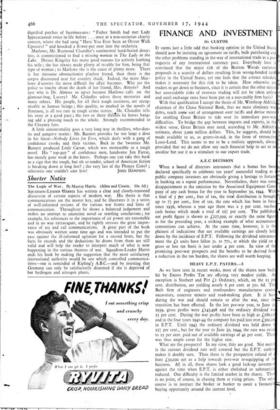FINANCE AND INVESTMEN
By CUSTOS
IT seems just a little odd that banking opinion in the United States should now be insisting on agreement on tariffs, bulk purchasing and the other problems standing in the way of international trade as a pre- requisite of any international currency pact. Everybody here is convinced that the major risk of the Bretton Woods currency proposals is a scarcity of dollars resulting from wrong-headed tariff policy in the United States, yet one feels that the correct schedule makes it necessary for this risk to be taken. How otherwise are traders to get down to business, since it is certain that the other rn mit but unavoidable risks of overseas trading will not be taken unless and until exchange rates have been put on a reasonably firm basis?
With that qualification I accept the thesis of Mr. Winthrop Aldrich, chairman of the Chase National Bank, that we must eliminate war debts, reach some sort of arrangement over tariffs and devise means for enabling Great Britain to tide over its immediate post-war difficulties. To bridge the gap between imports and exports, in the widest sense, Great Britain may need, according to Mr. Aldrich's estimate, about 3,000 million dollars. This, he suggests, should b.. made available to us, as grants-in-aid, in the form of retroactive Lease-Lend. This seems to me to be a realistic approach, alwas provided that we do not allow any such financial help to act as a anodine but use it as a stimulant to our export trade.
A.E.0 DECISION
When a board of directors announces that a bonus has bee declared specifically to celebrate ten years' successful trading as public company investors are obviously giving a hostage to fortun- in banking on a repeat performance. Nevertheless, there was so • a disappointment at the omission by the Associated Equipment Corn pany of any cash bonus for the year to September 3o, 1944. Wit a final of 5 per cent., free of tax, the total distribution is brough' up to 74 per cent., free of tax, the rate which has been in fore: since 1936, whereas a year ago there was a 5 per cent. tax-f re• cash bonus which made a total of 122 per cent. The publishe. net profit figure is shown as L227,500, or exactly the same fig Ur • as for the preceding year, a striking example of what accounta c conventions• can achieve. At the same time, however, it is th• plainest of indications that net available earnings are closely hel. down by the incidence of E.P.T. Following the dividend announce ment the Li units have fallen 3s. to 77s., at which the yield o gross or less tax basis is just under 4 per cent. In view of promising post-war prospects and the benefits to be derived fro a reduction in the tax burden, the shares are well worth keeping.
HEAVY E.P.T. PAYERS.-5
As we have seen in recent weeks, most of the shares now ba hit by Excess Profits Tax are offering very modest yields. AI exception is Stothert and Pitt LI Ordinary, which, on the 15 p cent. distribution, are yielding nearly 6 per cent. at sts. 6d. Thi Bath firm of engineers and ironfounders manufactures cran excavators, concrete mixers- and road-making plant. It is bus, during the war and should remain so after the war, once th transition has been effected. In the last pre-war year, to June 3. 1939, gross profits were £143,498 and the ordinary dividend wa 15 per cent. During the war profits have been as high as L186,11 and in the four years 1941-44 the company has paid just over k300,.II. in E.P.T. Until 1943 the ordinary dividend was held down t 124 per cent., but for the year to June 3o, 1944, the rate was raise, to 15 per cent. paid out of available earnings of 41 per cent. Ther was thus ample cover for the higher rate.
What are the prospects? In my view, thy are good. Not mere{ is the current dividend rate well covered but the E.P.T. cushio makes it doubly sure. Then there is the prospective refund of least £3opoo net as a help towards post-war re-equipping of t
business. All in all, these shares look a good lock-up investor; against the time when E.P.T. is either abolished or substantia reduced. One difficulty is the limited market in the shares. Th is no point, of course, in chasing them at rising prices. The safe course is to instruct the broker or banker to await a favoura buying opportunity around the current level.
th.
di'


























 Previous page
Previous page